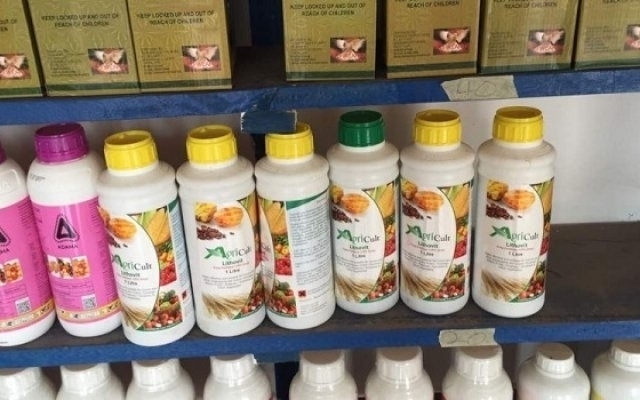Research Director at COCOBOD chooses lithovit fertilizer over others; says farmers also prefer it
 Litovit fertilizer
Litovit fertilizer
The Director of Research at Ghana Cocoa Board (COCOBOD), Dr. Francis Baah has confirmed in court that farmers who applied lithovit foliar fertilizer on their cocoa farms preferred it to other fertilizers.
The senior management member of COCOBOD also endorsed a report compiled by the Cocoa Health and Extension Division (CHED), following field trips to cocoa producing regions under the CODAPEC and HITECH program in 2015, which testified about the effectiveness of lithovit fertilizer on cocoa farms.
Dr. Francis Baah who is a subpoenaed witness for businessman Seidu Agongo was giving his evidence in chief at the high court on Wednesday, March 13, 2024 as he was led through the field report, which was admitted in court the previous day as Exhibit 138.
The composite report from the field visits to cocoa farms in seven cocoa regions included the executive director, deputy executive director, technical managers, and technical officers of CHED was among others to obtain “evidence of what is happening on the field”.
Dr. Baah who was the Executive Director of CHED when the field visits were conducted, told the court that the various teams interacted with farmers, agents and technical officers during the exercise.
His deputy then, in charge of monitoring and evaluation, Mr. Peter Okyere Boateng who has already given evidence on behalf of the former Chief Executive of COCOBOD, informed the court that while on the field, they took notes of farmers preference and issues, and reported them to Dr. Baah as their boss.
When Dr. Baah was asked about this, he admitted, “Yes my Lord I recall the mentioning of preference for lithovit fertilizer as against the granular fertilizers, that was specifically mentioned”.
He noted that the technical team, back from the field, suggested that a further study should be conducted involving more farms to “verify the perception” created by the farmers as well as was observed by the team.
Counsel for Seidu Agongo, Benson Nutsukpui then asked what was this perception, which he explained, “my Lord the perception that farmers show preference for liquid fertilizers as against granular”.
“Do you remember which liquid fertilizer the farmers were showing preference for,” the witness was asked.
“The team reported that the preference was for lithovit liquid fertilizer,” Dr. Baah answered.
The former Executive Director of CHED also confirmed that the team recommended in their report that COCOBOD should increase the number of lithovit because it was the preference of farmers.
“It is true that part of the recommendations from the field trips was for ‘additional fertilizer especially lithovit which farmers have shown preference should be purchased to augment the 700,000 litres already purchased’, that is in the report” Benson read from the field report.
In response, Dr. Baah stated, “My Lord it is a valid recommendation on the basis of the evidence that was gathered on the field.”
“In making this recommendation, was the team or you in anyway influenced by anybody to make that recommendation,” the witness was asked.
He replied, “My Lord I was not influenced by anybody and I believe the team members were also not influenced by anybody.”
Counsel also wanted to know the type of fertilizers described as foliar, the type lithovit falls under.
“My Lord when you say the fertilizer is applied on the leaves or foliage, for my [cumulatively 23] years at CRIG that would mean liquid,” Dr. Baah who also worked in Cocoa Research Institute of Ghana as a Director of Social Science and Statistics told the court.
He therefore brought to the knowledge of the court one of the key objectives of CHED’s field visits in 2015 which formed the basis for the report in evidence.
“The technical team on the ground in the districts have earmarked some farms in the districts for the application of the foliar fertilizers, so it was important that we go and find out how they were doing,” he recalled.
“When you look at page 3 of exhibit 138, number 4 potential crops, the team observed that the general observation across the districts visited was that young cocoa farms were ladened with flowers, cherelles and pods. ‘The situation was more dramatic where the farms were sprayed with foliar fertilizers especially lithovit’ that was in the report,” counsel asked the witness after reading a portion of the report.
Dr. Baah’s answer was “Yes my Lord”, and he further noted that “that is correct, that is the composite observations from the teams”.
“The team also observed, the effect of lithovit on young cocoa that that is their fertilizer of choice; they do not want granular fertilizer. This observation was also made by the team, that is correct,” counsel further asked, and the witness replied “That is correct”.
He was also shown a picture on page 5 of the report of young cocoa farms in the Central region which was fertilized with lithovit the previous year. “It is in our report, so it's correct,” he corroborated.
The witness also responded in the affirmative when he was shown in that report trees that used Sidalco.
He was therefore asked to compare the two pictures.
“What I see here is two contrasting pictures, Central region and Western North, sprayed with two different foliar fertilizers. As far as my eyes can see, it appears the first picture has more pods than the second one,” he observed.
He was then asked to tell the court which fertilizer was used to spray the first picture which he said has more pods.
“My Lord the label on the picture indicates that it was lithovit fertilizer which was applied,” Dr. Baah said.
“Which of the trees in the two pictures would COCOBOD prefer,” lawyer Benson Nutsukpui asked the witness.
“My Lord we always want more cocoa, if I represent COCOBOD I will prefer the first picture,” the Director of Research at COCOBOD told the court.
The former COCOBOD Chief Executive, Dr. Stephen Opuni and businessman Seidu Agongo as well as Agricult Ghana Limited, have been facing 27 charges, including defrauding by false pretences, willfully causing financial loss to the state, corruption by public officers and contravention of the Public Procurement Act
Source: Classfmonline.com
Trending News

E/R: Kwahu Traditional Council gives IGP three-week ultimatum to release Abene Chief’s Palace
02:22
Mahama orders $78m payment to Justmoh to resume Agona–Nkwanta road works
08:01
Youth unemployment now a National security concern – Opare Addo
08:43
Parliament approves concession agreement for Accra-Kumasi expressway
08:15
Gender Minister hosts Christmas feast for children in residential care homes
02:09
GFL Secretary-General warns NDC against arrogance and complacency in power
07:54
Weija Water Treatment Plant to shut down for scheduled maintenance today Dec. 19
07:07
60 lives lost at Madina Zongo junction as pedestrians ignore footbridge-MCE
07:10
C/R: MP announces plans for nursing training college, new SHS in Kasoa
02:01
Wa West MP commends Energy Minister Jinapor for improved power stability
09:03




